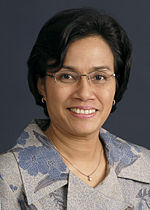
Wiranto is an Indonesian politician and retired army general, who is serving as the chairman of the Presidential Advisory Council, since December 2019. Previously, he was the Commander of the Indonesian Armed Forces from February 1998 to October 1999 during Indonesia's transition from authoritarian rule to democracy, he ran unsuccessfully for President of Indonesia in 2004 and for the vice-presidency in 2009. On 27 July 2016, Wiranto was appointed Coordinating Minister for Political, Legal, and Security Affairs, replacing Luhut Binsar Panjaitan.

Muhammad Jusuf Kalla, commonly referred to by his initials JK, is an Indonesian politician and businessman who served as the 10th and 12th vice president of Indonesia, the only vice president in Indonesian history to serve two non-consecutive terms in office. He was unsuccessful as Golkar's presidential nominee in the 2009 presidential election. Before Kalla declared himself as the running mate for Joko Widodo in the 2014 presidential election, a 2012 poll placed his popularity among likely voters in the top three contenders for the presidency and ahead of his own party's nominee Aburizal Bakrie.
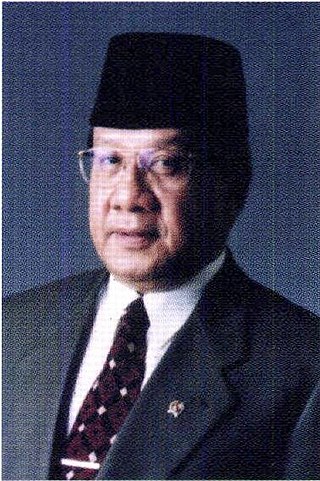
Djandji Akbar Zahiruddin Tandjung is an Indonesian politician who served as the Speaker of the People's Representative Council from 1999 until 2004. A member of the Golkar party, he also served as the party's chairman from 1999 until 2004 and was a member of the People's Representative Council from East Java from 1977 until 2004.
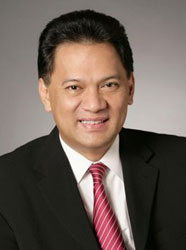
Agus Dermawan Wintarto Martowardojo is an Indonesian economist and banker who served as Governor of Bank Indonesia, Indonesia's central bank, from 2013 to 2018. Previously, he served as Minister of Finance from 2010 to 2013 after succeeding former minister Sri Mulyani Indrawati, who resigned from the office and took position as Managing Director of the World Bank Group.
Between 1981-2016, Euromoney magazine awarded the Finance Minister of the Year award. This award was given to a country Finance Minister who reformed or innovated their countries economy during their tenure. In Australia, the award is colloquially nicknamed "World's Greatest Treasurer" after Paul Keating won in 1984. The award has not been given since 2017, with the magazine focusing their articles and awards on Banking Excellence.

Boediono is an Indonesian politician and economist who served as the 11th vice president of Indonesia from 2009 to 2014. He became vice president after winning the 2009 presidential election together with the then-incumbent President Susilo Bambang Yudhoyono. Before this, he had been the Governor of the Indonesian Central Bank and a professor of economics at Gadjah Mada University.

Mohammad Mahfud Mahmodin, commonly known as Mahfud MD, is an Indonesian politician, and legal academic who served as the 14th Coordinating Minister for Political, Legal, and Security Affairs of Indonesia from 2019 to 2024. He also previously served as the Chief Justice of the Constitutional Court of Indonesia, member of the People's Representative Council, Minister of Defense, and Minister of Law and Human Rights.

Sandiaga Salahuddin Uno is an Indonesian businessman, investor and politician who served as Minister of Tourism and Creative Economy from 2020 to 2024. Prior to that, he was the Deputy Governor of Jakarta, elected along with Anies Baswedan in the 2017 Jakarta gubernatorial election after defeating incumbent pair Basuki Tjahaja Purnama and Djarot Saiful Hidayat. He resigned the office to run as Prabowo Subianto's running mate for the 2019 Indonesian presidential election.

The roles of women in Indonesia today are being affected by many factors, including increased modernization, globalization, improved education and advances in technology. Many Indonesian women choose to reside in cities instead of staying in townships to perform agricultural work because of personal, professional, and family-related necessities, and economic requirements. These women are moving away from the traditional dictates of Indonesian culture, wherein women act simply and solely as wives and mothers. At present, the women of Indonesia are also venturing actively into the realm of national development, and working as active members of organisations that focus and act on women's issues and concerns.
The Union of Independent People , abbreviated as SRI, is a dormant political party in Indonesia established on 2 May 2011 by supporters of finance minister and former World Bank managing director Sri Mulyani Indrawati who aspired for her candidacy in the 2014 Indonesian presidential election.
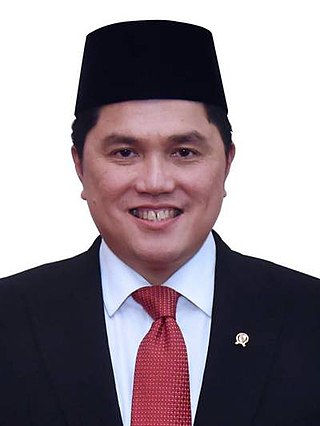
Erick Thohir is an Indonesian businessman and politician who served as Indonesia's Minister of State Owned Enterprises from 2019 to 2024. He is the chairman of Football Association of Indonesia since 2023 and founder of Mahaka Group, a conglomeration that focuses on media, sports and entertainment. Globally known as the former owner and chairman of Italian football giant Inter Milan and US soccer club D.C. United, Thohir is currently co-owner alongside Anindya Bakrie of English Championship team Oxford United and Liga 1 team Persis Solo along with Kaesang Pangarep, the youngest son of President Joko Widodo. He was also the president director of ANTV television station and the chief of the Indonesian Olympic Committee. In 2019, he became a member of the International Olympic Committee (IOC). Thohir is also currently a member of the FIBA Central Board.

Muhammad Chatib "Dede" Basri is an Indonesian economist who served as Minister of Finance in the Second United Indonesia Cabinet from 21 May 2013 to 20 October 2014 during the presidency of Susilo Bambang Yudhoyono. Before he was appointed Minister of Finance he was the head of the Indonesian Investment Coordinating Board.

Hashim Sujono Djojohadikusumo is an Indonesian entrepreneur and politician who is the younger brother of Indonesian president Prabowo Subianto. In 2014, he was considered a billionaire. As of December 2020, Forbes estimates his net worth at $800 million.

Retno Lestari Priansari Marsudi is an Indonesian diplomat who formerly served as the Minister for Foreign Affairs in the Cabinet of Joko Widodo between 2014 and 2024. She is the first female minister appointed to the post. She was previously the Indonesian Ambassador to the Netherlands from 2012 to 2014, as well as Ambassador to Iceland and Norway from 2005 to 2008.

Bambang Soesatyo, more colloquially referred to as Bamsoet, is an Indonesian politician and businessman, who served as the 15th speaker of the People's Consultative Assembly between 2019 and 2024, and as a member of the House of Representatives since 2009. A member of Golkar, he previously served as the 18th speaker of the House of Representatives following the resignation of Setya Novanto.
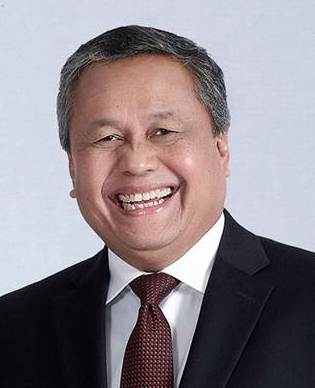
Perry Warjiyo is the current Governor of Bank Indonesia, Indonesia's central Bank. His nomination for the post of Governor was approved by the Indonesian parliament on 28 March 2018. He was sworn into office on 24 May 2018, succeeding the previous Governor Agus Martowardojo.
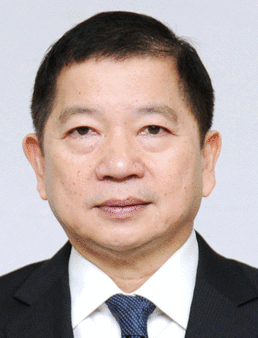
Suharso Monoarfa is an Indonesian entrepreneur and politician who served as Minister for National Development Planning from 2019 to 2024. He was also a member of the Presidential Advisory Council.
The 2018 Asian Games closing ceremony was held on Sunday, 2 September 2018 at the Gelora Bung Karno Main Stadium in Jakarta. It began at 19:00 Indonesia Western Time (UTC+7) and ended at 21:25 local time. Like the opening ceremony, host event broadcasting company International Games Broadcast Services (IGBS) broadcast the ceremony live internationally. Vice President of Indonesia Jusuf Kalla, president of International Olympic Committee Thomas Bach, and president of Olympic Council of Asia Sheikh Ahmad Al-Fahad Al-Sabah were among the dignitaries in attendance.

Effendi Muara Sakti Simbolon is an independent Indonesian politician who has been a member of the People's Representative Council (DPR) since 2004. Despite coming from the same political party, Simbolon was a noted critic of president Joko Widodo, especially in Widodo's first years as president. Effendi Simbolon served as a member of PDI-P from 2004 until his dismissal in 2024.
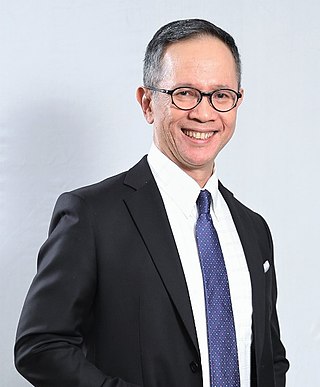
Mahendra Siregar is the chief of the Financial Services Authority (OJK) of Indonesia. He previously served as Deputy Foreign Minister and was formerly the Indonesian Ambassador to the United States. On 25 October 2019, he was appointed as the deputy minister of foreign affairs supporting Indonesian foreign minister Retno Marsudi in the second Jokowi cabinet appointed two days earlier on 23 October. Earlier, he had been appointed as Ambassador to the US by President Joko Widodo in 2018. He took up his post in Washington DC in early 2019. Mahendra is a respected economist in Indonesia who has held various senior positions within the Indonesian bureaucracy.

